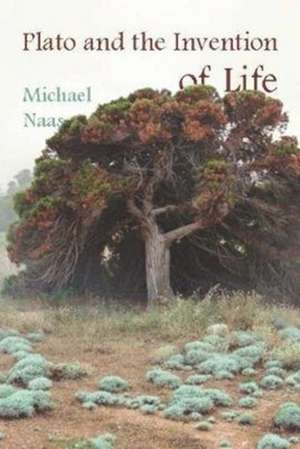Plato and the Invention of Life
Autor Michael Naasen Limba Engleză Paperback – 2 apr 2018
¿Michael Naas's remarkable account of Plato traces the contemporary line between bios and z¿¿, which has been an abiding feature of recent discussions of biopolitics, to reveal the original Platonic invention of the division between 'Life itself' and all other forms of living, including eternal life. Perhaps another way of saying this, according to Naas, is that already in Plato there is Platonism, the opposite of Platonism, and the deconstruction of every future Platonism.¿¿Gregg Lambert, Syracuse University
¿This book offers a novel, timely, and provocative reading of the pervasive theme of life in Plato and its significance for the history of Western thought. Naas highlights the dialogue that Michel Foucault, Jacques Derrida, Giorgio Agamben, and others have carried on with Platöoffering his own supplements and corrections along the way. The result is a compelling and thought-provoking reading of Platös contribution to what is perhaps the most vital and volatile concept in contemporary theoretical discourse.¿¿Sara Brill, Fairfield University
The question of life, Michael Naas argues, though rarely foregrounded by Plato, runs through and structures his thought. By characterizing being in terms of life, Plato in many of his later dialogues, including the Statesman, begins to discover¿or, better, to invent¿a notion of true or real life that would be opposed to all merely biological or animal life, a form of life that would be more valuable than everything we call life and every life that can actually be lived.
This emphasis on life in the Platonic dialogues illuminates the structural relationship between many of Platös most time-honored distinctions, such as being and becoming, soul and body. At the same time, it helps to explain the enormous power and authority that Platös thought has exercised, for good or ill, over our entire philosophical and religious tradition.
Lucid yet sophisticated, Naas¿s account offers a fundamental rereading of what the concept of life entails, one that inflects a range of contemporary conversations, from biopolitics, to the new materialisms, to the place of the human within the living world.
Michael Naas is Professor of Philosophy at DePaul University. He is the author most recently of The End of the World and Other Teachable Moments: Jacques Derrida's Final Seminar.
Preț: 287.69 lei
Nou
55.05€ • 58.87$ • 45.90£
Carte indisponibilă temporar
Specificații
ISBN-10: 0823279685
Pagini: 288
Dimensiuni: 151 x 228 x 18 mm
Greutate: 0.36 kg
Editura: ME – Fordham University Press
Cuprins
Introduction: Philosophy¿s Gigantomachia over Life and Being
1. The Lifelines of the Statesman
2. Life and Spontaneity
3. The Shepherd and the Weaver: A Foucauldian Fable
4. The Measure of Life and Logos
5. Fruits of the Poisonous Tree: Plato and Alcidamas on the Evils of Writing
6. The Life of Law and the Law of Life
7. Plato and the Invention of Life Itself
Conclusion: Life on the Line
Acknowledgments
Notes
Index
